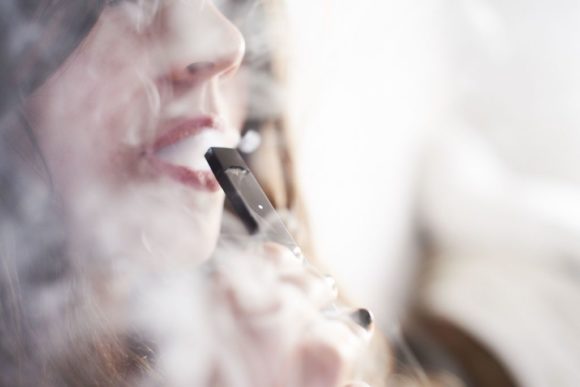Juul Labs Inc. has the Mafia to thank for the most potent legal claims accusing the e-cigarette maker of igniting an epidemic of youth nicotine addiction.
The company will try to persuade a federal judge Monday that consumers and school districts can’t sue it under the Racketeer Influenced and Corrupt Organizations Act, which has been called “the litigation equivalent of a thermonuclear device.”
The 1970 law was originally designed to prosecute organized crime but has also been used in civil lawsuits, including against tobacco companies. If Juul fails to get the RICO claims knocked out of the lawsuits at the earliest opportunity, it faces the prospect of being on the hook for triple damages and the plaintiffs’ attorneys fees, which is likely to put a lot more pressure on the company to settle.
“It’s a very powerful weapon in plaintiffs’ arsenal,” said Nora Freeman Engstrom, a professor at Stanford Law School. “Proving RICO can be challenging, but the payoff can be substantial.”

Juul said it will respond to the RICO allegations “through the appropriate legal channels.
“We will continue to reset the vapor category in the U.S. and seek to earn the trust of society by working cooperatively with attorneys general, legislators, regulators, public health officials, and other stakeholders to combat underage use and transition adult smokers from combustible cigarettes,” the company said in a statement.
Juul, its founders and Altria Group Inc., which owns a 35% stake in Juul, face hundreds of suits that have been consolidated in federal court in San Francisco and in California state court in Los Angeles.
The complaints allege that Juul took a page out of the tobacco industry’s play book by creating a highly addictive nicotine product, marketing it as a benign smoking cessation device, and targeting children as a customer base.
To reach the kids, the plaintiffs claim, Juul relied on a “diabolical pairing” of cigarette company advertising techniques with cutting-edge viral marketing campaigns and social media.
“They hired young models and advertised using bright, ‘fun’ themes, including on media long barred to the cigarette industry, such as billboards, on children’s websites such as ‘Nick Junior’ and Cartoon Network, and on websites providing games and educational tools to students in middle school and high school,” according to the consolidated class-action complaint.
But to turn such allegations into a successful RICO claim is a further step — one that Engstrom says poses “a series of daunting hurdles.”
Juul denies in court filings there was any illegal “enterprise” in its business relationships under the meaning of the law, and argues that its alleged misrepresentations about e-cigarettes don’t amount to fraudulent “racketeering.”
Moreover, the company says, the school districts’ cause-and-effect logic about the harms they’ve suffered coping with teen vaping is sketchy — and doesn’t account for the actions of other e-cigarette manufacturers.
But even Juul’s strongest arguments probably won’t kill the RICO claims immediately, according to Sean Andrade, an attorney with Andrade Gonzalez LLP in Los Angeles.
Big Tobacco
“The big question is does the court see this as part of the bigger fight against tobacco,” Andrade said. If the plaintiffs “can get the judge to buy into that, they may have a good chance.”
The historical parallels are significant, he said. The federal government successfully sued Philip Morris and other tobacco companies in 1999 for civil RICO violations by alleging a conspiracy to deceive the American public about the dangers of smoking and second-hand smoke as well as the addictiveness of nicotine.
Beyond the financial exposure from RICO claims, there’s also a stigma attached to being branded a racketeer, said Joseph Balice, an attorney with Brutzkus Gubner in Los Angeles.
“It will be of the utmost importance for the defendant to get it thrown out at the earliest opportunity.”
Was this article valuable?
Here are more articles you may enjoy.


 Berkshire Utility Presses Wildfire Appeal With Billions at Stake
Berkshire Utility Presses Wildfire Appeal With Billions at Stake  Portugal Rolls Out $2.9 Billion Aid as Deadly Flooding Spreads
Portugal Rolls Out $2.9 Billion Aid as Deadly Flooding Spreads  Cape Cod Faces Highest Snow Risk as New Coastal Storm Forms
Cape Cod Faces Highest Snow Risk as New Coastal Storm Forms  Uber Jury Awards $8.5 Million Damages in Sexual Assault Case
Uber Jury Awards $8.5 Million Damages in Sexual Assault Case 